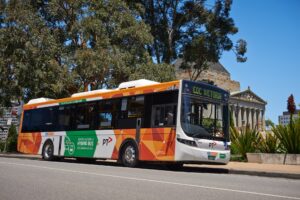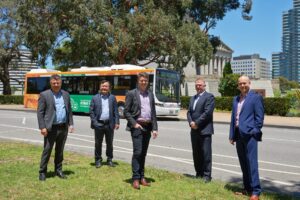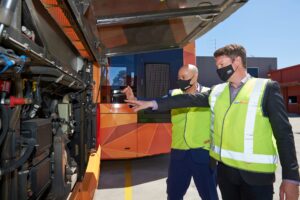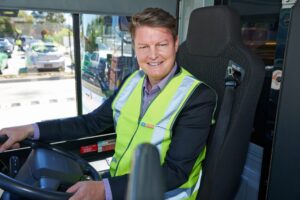CDC Victoria’s locally built Volvo hybrid (self-charging electric) buses will be fitted with technology to make Victoria’s public transport network a greener, more sustainable network following the launch of Volvo’s Zone Management system.
The technology innovation allows CDC Victoria’s existing hybrid fleet (the largest in Australia) to achieve zero emissions in designated zones that not only improves the passenger experience for commuters in Melbourne, but also for pedestrians and outdoor diners.
The new system follows an extensive trial and will allow the existing hybrid (self-charging electric) buses to operate exclusively in electric drive mode within designated zones, promising a silent ride for commuters and less road noise for residents and other road users.
Minister for Public Transport for Victoria, The Hon. Ben Carroll, said: “This new technology is a welcome addition to the State’s bus fleet as we continue to explore innovative ways to reduce emissions. In a first for Australia, this new technology will bring immediate benefits for passengers and people in the busy designated zones through quieter vehicles and zero emissions.”
Volvo’s Zone Management system is powered by geofencing technology and telematics – which is a first for Australia and within the Asia Pacific region.
ComfortDelGro Corporation Australia CEO, Nicholas Yap, said: “We are so excited to be the first in Australia to achieve zone based zero emissions on our existing Hybrid bus fleet and believe that this technology innovation revolutionises our Victorian operations without the need for extensive infrastructure.”
“This new system will greatly benefit the local community promising a silent ride with zero emissions in a variety of locations, for a cleaner, greener Australia,” says Yap.
The innovative Zone Management system revolutionises and optimises CDC Victoria’s hybrids elevating the fleet to the next level of performance without relying on the electricity grid or requiring expensive infrastructure for charging.
The technology innovation also directly supports the local automotive industry in Victoria with works carried out by CMV Truck and Bus in Derrimut and Volgren in Dandenong. This allows for job creation and maintenance, a cleaner environment and promotes transport resilience for Australia.
Vice President Volvo Bus, Asia Pacific, David Mead, said: “Volvo’s partnership with CDC spans the country. We are excited to be partnering with CDC on this journey in Melbourne and for allowing us to introduce innovation with a trusted partner.”
“The application of Volvo’s Zone Management feature will allow our customers’ like CDC to drive longer and emission free on electricity without the need to modify their operations,” says Mead.
Nine of the hybrid buses with the Volvo’s Zone Management system have commenced operations on the streets of Melbourne, including on bus route 605 which runs into Melbourne CBD, the Botanical Gardens and the Shrine of Remembrance, as well as Route 630 which serves busy Monash University and Huntingdale Station. The remainder of the existing CDC Victoria’s hybrid fleet will be fitted with this new system in two stages over the next 4 months.



